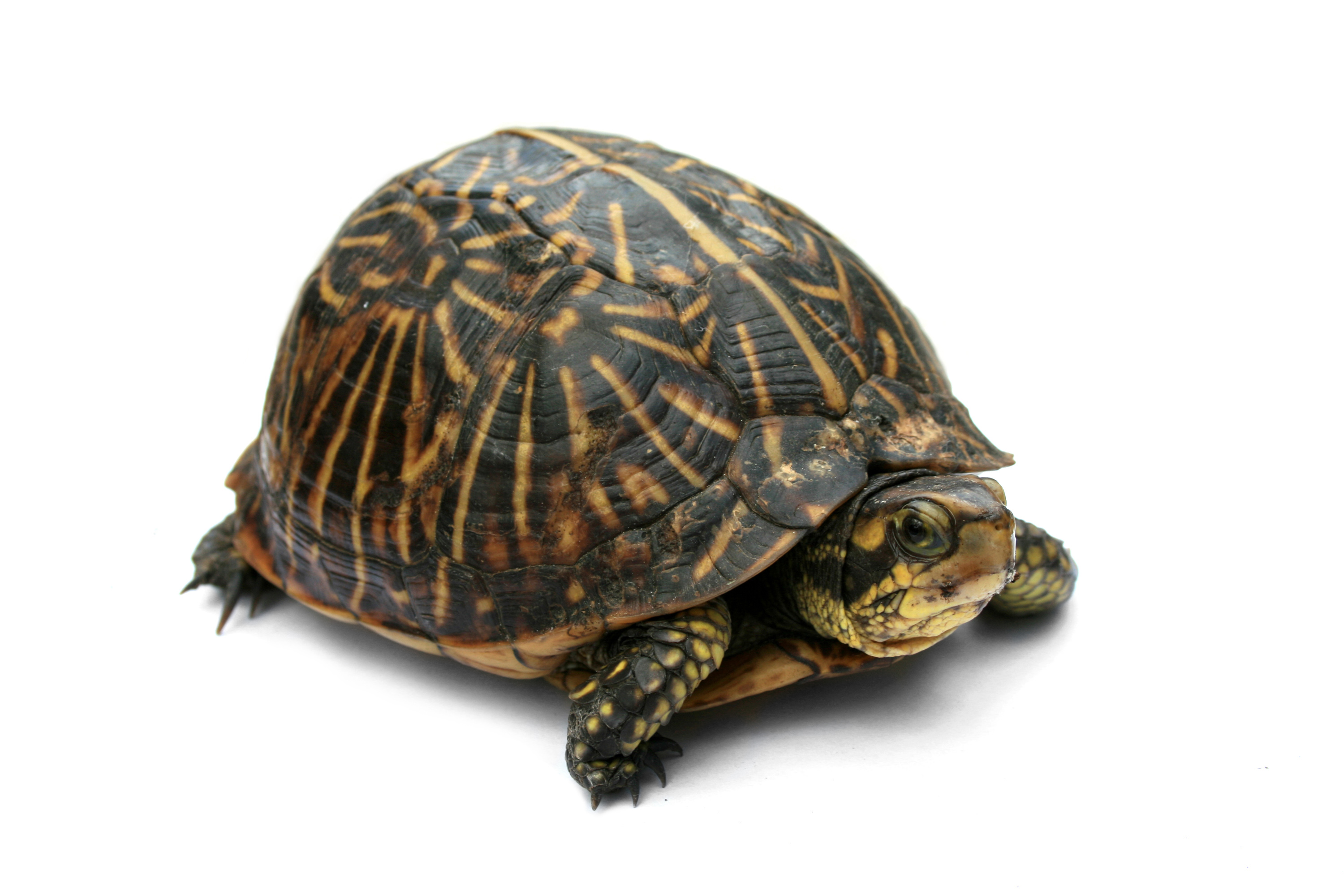- Box turtle
Taxobox
name = Box Turtle

image_width = 250px
image_caption = Florida Box Turtle, "Terrapene carolina bauri"
regnum =Animal ia
phylum =Chordata
classis = Reptilia
ordo =Testudines
familia =Emydidae
subdivision_ranks = Genera
subdivision = "Cuora "
"Pyxidea "
"Terrapene "The box turtle or box tortoise [ [http://dictionary.reference.com/browse/Box%20tortoise Box tortoise - Definitions from Dictionary.com ] ] is one of several
species ofturtle . It can refer to either those of the genera "Cuora " or "Pyxidea ", which are the Asian box turtles, or more commonly to species of the genus "Terrapene ", theNorth America n box turtles. They are largely characterized by having adome d shell, which is hinged at the bottom, allowing the animal to close its shell tightly to escape predators. Otherwise the two genera are very different in habitat, behavior, and appearance, and as such are not even classified in the same family. Even though box turtles have become very popularpet s, their needs in captivity are complex and the capture of turtles can have serious detrimental effects on the wild population.The average life span of box turtles is 40 years. However, it is possible for a box turtle to live for over 100 years. [ cite web | title = Box Turtles | publisher = Twin Groves Museums in the Classroom Team | date =
1998-06-27 | url = http://www.twingroves.district96.k12.il.us/WEtlands/Turtles/BoxTurtle/BoxTurtle.html | accessdate = 2008-06-27 ]Diet
North American box turtles are
omnivore s. Their sharp eyes and keen sense of smell help them in finding food such as snails, insects, berries, fungi, slugs, worms, roots, flowers, fish, frogs, salamanders, various rodents, snakes, birds, and eggs. During their first five to six years, the young are primarily carnivorous while they grow. Adults tend to be mostly herbivorous, but they do not eat green leaves. [ [http://nationalzoo.si.edu/Animals/ReptilesAmphibians/Facts/FactSheets/Easternboxturtle.cfm Box Turtle Fact Sheet - National Zoo| FONZ ] ] Box turtles have been known to eat road-kill. Babies and young turtles need more protein and prefer a carnivorous diet, and then include more and more plant matter as they get older. [ cite web | title = Get Your Turtle to Eat | publisher = The Ornate Bird Garden | date =2007-08-18 | url = http://www.ornatebirdgarden.com/html/turtlediet.html | accessdate = 2007-08-31 ]tudies
A study by
Davidson College revealed that a box turtle snapping its jaw shut can produce sounds as loud as 75 dB. This sound can be used to scare away predators or possibly even be used as a mating call. [ [http://www.bio.davidson.edu/people/midorcas/research/Contribute/Box%20Turtle/whatwedo.htm The Davidson College Box Turtle Study ] ]Mating
While it appears that most "Terrapene carolina" mating occurs in one-to-one encounters, there are occasions when two males will contend for access to a single female. These encounters consisting of butting, shoving, and perhaps attempting to overturn each other. One of the males eventually becomes exhausted and retires from the field while the other wins access to the female.Fact|date=October 2007
Threats
Habitat destruction is the biggest problem facing box turtles. Woodlands converted into farmland have reduced the turtles range in many US states. [http://www.snakes.co.nr The Snakes Found in Indiana ] ] Remaining land is often fragmented with roads and housing projects, breaking up the animals' habitat. As they try to cross manmade additions, turtles are often killed by cars, animals, and other dangers. [ [http://www.bio.davidson.edu/people/midorcas/research/Contribute/box%20turtle/boxinfo.htm Eastern Box Turtle Information ] ]
A further threat to these animals in North America is the capture and sale of wild-born box turtles. A 3-year study in
Texas indicated that over 7,000 box turtles were taken from the wild for commercial trade. A similar study inLouisiana found that in a 41-month period, nearly 30,000 box turtles were taken from the wild for resale. Once captured, turtles are often kept in poor conditions where up to half of them die. Those living long enough to be sold usually suffer from conditions such asmalnutrition ,dehydration , andinfection . [http://www.btpt.org/pubs/BTPT_faq.pdf] [ [http://www.chelonian.org/ttn/archives/ttn1/pp19.shtml TTN 1:19 ] ]Indiana and other states have laws against collecting the turtles from the wild. In many states, it is illegal to keep them without a permit. Collecting box turtles from the wild may cause irreversible damage in the populations, as these turtles have a low reproduction rate and have a hard time finding a mate.
Most turtle and tortoise societies recommend against box turtles as pets for small children. Box turtles are easily stressed by overhandling and require more care than is generally thought. Box turtles can be easily injured by dogs and cats so special care must be taken to protect them from household pets and neighborhood animals. Box turtles require an outdoor enclosure, consistent exposure to the sun and a varied diet. Without these, a turtle's growth can be stunted and its immune system weakened.
Finding box turtles in the wild and taking them as pets, even for a very short period of time, can have detrimental effects. Box turtles want to stay within the same area where they were born. If one is moved more than a half-mile from its territory, it may never find its way back; but may spend years unsystematically searching. This exposes the animal to danger and also disrupts the breeding cycle. [ [http://www.chesapeakebay.net/info/eastern_box_turtle.cfm Chesapeake Bay Program - Critter of the Month ] ]
Taxonomy
"See
Box turtle species "Notes
References
* [http://www.reptile-database.org/ Reptile Database]
* [http://www.itis.gov/ Integrated Taxonomic Information Service]
* [http://www.snakes.co.nr/ The Snakes Found in Indiana with Informal Box Turtle information]External links
* [http://www.boston.com/travel/gallery/zoo_babies?pg=10 Golden Coin Box Turtle hatches] A newborn golden coin box turtle at the Chester Zoo in Chester, England. The baby, one of three to be born at the zoo, is the first of the critically-endangered species ever to hatch in the United Kingdom.
* [http://www.herpnet.net/Iowa-Herpetology/index.php?option=com_content&task=view&id=68&Itemid=26 Ornate Box Turtle - Terrapene ornata] Species account from the Iowa Reptile and Amphibian Field Guide
* [http://www.snakes.co.nr The Snakes of Indiana, with informal information about box turtles]
* [http://www.chelonia.org/Articles/TerrapenecareSZ.htm Article on box turtle natural history and care]
Wikimedia Foundation. 2010.
